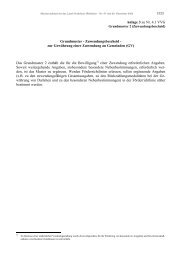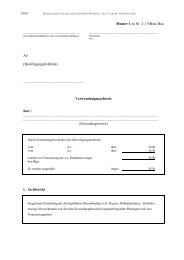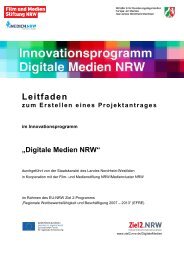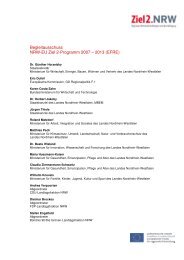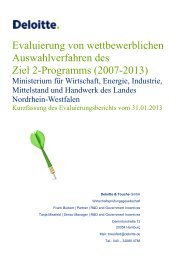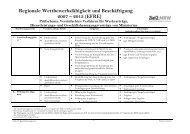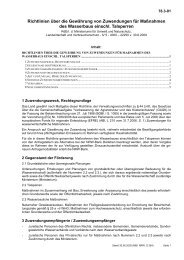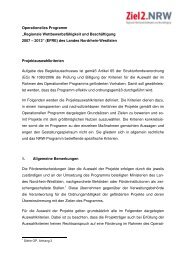Synthesis Report - European Commission - Europa
Synthesis Report - European Commission - Europa
Synthesis Report - European Commission - Europa
You also want an ePaper? Increase the reach of your titles
YUMPU automatically turns print PDFs into web optimized ePapers that Google loves.
<strong>Synthesis</strong> <strong>Report</strong> Ex-post Evaluation of the ERDF 2000-2006<br />
Moreover, in most countries, as for Objective 1 regions, enterprise support accounted for a larger<br />
share of funding in remote rural areas than in those close to a city, which added to the larger<br />
share going to tourism in the former. Accordingly, there was much more direct support for<br />
economic activity in remote rural areas than in less remote ones, again reflecting perhaps the<br />
greater need for an internal source of income and jobs.<br />
1.4 POLICY OBJECTIVES, ECONOMIC THEORY AND POLICY RECOMMENDATIONS<br />
As noted above, the division of funding between policy areas indicates the effort devoted to<br />
tackling problems and/or improving the situation and, accordingly the relative focus of policy in<br />
the different regions. The issue considered here is how far this focus was in line with both the<br />
findings of theories of economic development and the policy recommendations in this regard of<br />
international organisations and, accordingly, with the external advice available on the strategy to<br />
pursue to further economic development.<br />
Six different strands of theory can be identified from the literature which span the different<br />
models of growth developed over the years and which underlie the recommendations of<br />
international organisations. Each of these six strands puts emphasis on the need for policy to<br />
focus on a particular set of drivers of economic development:<br />
• a first strand emphasises the importance of economic integration, liberalisation of trade<br />
and markets and financial stability for sustained regional development, a view endorsed<br />
by international organisations;<br />
• a second strand stresses the role of investment and a favourable business environment as<br />
engines of growth; this is reflected in the wide array of measures recommended by<br />
international organisations in this regard, such as support for SMEs, incentives to attract<br />
FDI, the increased availability of venture capital and the provision of business support<br />
services;<br />
• a third strand focuses on human capital and policies for making fuller use of the potential<br />
of the work force, such as increasing the participation of various social groups as well as<br />
raising skills and competences through investing in education and training;<br />
• a fourth strand lays stress on innovation and technology and, accordingly, on measures<br />
for increasing both public and private investment in R&D as well as for strengthening<br />
links between research centres and business and the capacity to make effective use of<br />
new developments;<br />
• a fifth strand emphasises the economic benefits of agglomeration from technological and<br />
other externalities and a large market for skilled labour as well as for goods and services.<br />
This provides support for both the removal of constraints on the continuing growth of<br />
existing agglomerations and measures which encourage the development of new centres<br />
of economic activity;<br />
• a sixth strand stresses the importance of various aspects of the regional environment for<br />
growth, including social, political and institutional dimensions as well as economic, the<br />
emphasis being on the coherence of the system as a whole rather than on individual<br />
elements. Policy recommendations include measures to encourage cooperation between<br />
firms, a widening of participation in decision-making and the development of effective<br />
administrative authorities.<br />
42



